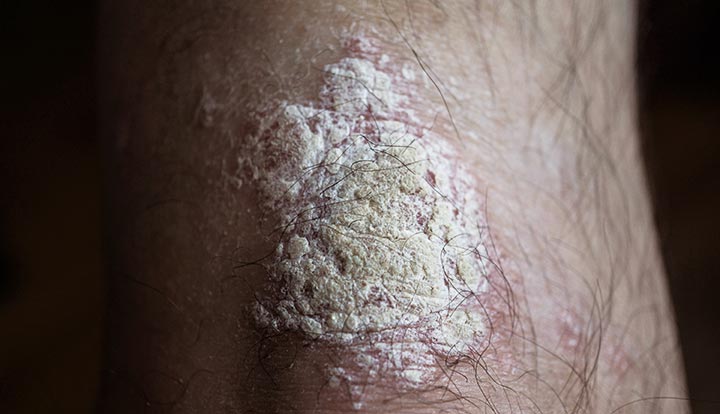it is a chronic autoimmune skin disorder marked by raised, inflamed, and scaly patches on the skin. As the most common form of psoriasis, it affects approximately 80% to 90% of individuals diagnosed with the condition. Plaque psoriasis results from an overactive immune system that accelerates the life cycle of skin cells, causing them to build up rapidly on the surface. These buildups lead to thickened, red plaques covered with silvery-white scales.

Understanding: An Autoimmune Skin Condition
Plaque psoriasis arises when T-cells, a type of white blood cell, mistakenly attack healthy skin cells. This immune response causes excessive skin cell production, leading to inflammation and the characteristic plaques. The condition is non-contagious, but it can be persistent and affect quality of life significantly if left untreated.
Common Signs and Symptoms
The manifestations of plaque psoriasis can vary in severity and distribution. However, typical symptoms include:
- Thick, raised red patches of skin (plaques)
- Silvery-white scales covering the plaques
- Dry, cracked skin that may bleed
- Itching, burning, or soreness around affected areas
- Plaques commonly appearing on the scalp, elbows, knees, and lower back
- Nail changes, such as pitting or discoloration
Flare-ups may alternate with periods of remission, during which symptoms diminish or disappear.
Causes and Risk Factors Associated with it
While the precise cause of plaque psoriasis remains unknown, a combination of genetic, immunologic, and environmental factors contributes to its onset.
Primary Causes:
- Genetic predisposition: Family history increases susceptibility.
- Immune system dysfunction: Misguided immune response leads to skin inflammation and rapid cell turnover.
Risk Factors:
- Stress: Can trigger or worsen flare-ups
- Skin injuries: Cuts, burns, or insect bites may initiate a psoriasis outbreak (Koebner phenomenon)
- Infections: Especially streptococcal throat infections
- Certain medications: Including beta-blockers, lithium, and antimalarials
- Cold, dry climates: Aggravate symptoms
- Smoking and alcohol: Increase risk and severity
Diagnosis: How Is it Identified
A diagnosis is generally made through physical examination and clinical history. In some cases, a skin biopsy is performed to rule out similar dermatologic conditions such as eczema or seborrheic dermatitis.
Types of Psoriasis and Comparison with Plaque Psoriasis
While plaque psoriasis is the most prevalent form, other types include:
| Type | Description | Distinct Feature |
|---|---|---|
| Guttate psoriasis | Small, drop-shaped lesions, often triggered by infection | Common in children and adolescents |
| Inverse psoriasis | Smooth, red lesions in skin folds | Appears in armpits, groin, under breasts |
| Pustular psoriasis | White pustules surrounded by red skin | May be localized or generalized |
| Erythrodermic psoriasis | Widespread redness, scaling, and discomfort | Rare but life-threatening |
Effective Treatment Options for Plaque Psoriasis
1. Topical Treatments
- Corticosteroids: First-line treatment for mild to moderate cases
- Vitamin D analogs: Calcipotriene slows cell growth
- Coal tar: Reduces scaling and itch
- Salicylic acid: Promotes scale removal and enhances absorption of other topicals
2. Phototherapy (Light Therapy)
- UVB therapy: Slows down skin cell turnover
- PUVA: Combines UVA light with psoralen medication
- Excimer laser: Targets specific plaques
3. Systemic Medications
Reserved for moderate to severe cases or those unresponsive to topical treatment:
- Methotrexate: Reduces immune response and inflammation
- Cyclosporine: Suppresses T-cell activity
- Acitretin: An oral retinoid effective for thickened plaques
4. Biologic Therapies
Targeted immune-modulating drugs, especially useful for severe plaque psoriasis:
- TNF-alpha inhibitors: Etanercept, Adalimumab
- IL-17 inhibitors: Secukinumab, Ixekizumab
- IL-23 inhibitors: Guselkumab, Tildrakizumab
Lifestyle Modifications and Home Care for Plaque Psoriasis
Daily care and changes in lifestyle can reduce flare-ups and ease discomfort:
- Regular moisturizing: Prevents dryness and scaling
- Avoiding harsh soaps: Use fragrance-free, gentle cleansers
- Stress management techniques: Meditation, yoga, and breathing exercises
- Dietary adjustments: Anti-inflammatory diets rich in omega-3 fatty acids
- Limiting alcohol and quitting smoking: Can reduce severity of symptoms
Complications Associated with Plaque Psoriasis
Chronic plaque psoriasis can lead to complications if not managed appropriately:
- Psoriatic arthritis: Joint pain and stiffness affecting up to 30% of patients
- Increased cardiovascular risk: Due to systemic inflammation
- Mental health issues: Depression and anxiety are common in severe cases
- Social stigma and isolation: Due to visible skin symptoms
Ongoing Research and Future Therapies
Medical research continues to evolve, offering hope for more targeted and long-term solutions. Current developments include:
- Novel biologics targeting additional inflammatory pathways
- Gene therapy research to address genetic susceptibility
- JAK inhibitors being explored for oral treatment options
Advancements focus on improving efficacy, reducing side effects, and providing personalized treatment plans.
FAQs:
Q1: Is plaque psoriasis contagious?
No, plaque psoriasis is not contagious and cannot be spread through contact.
Q2: Can plaque psoriasis go away completely?
While there is no cure, treatment can lead to remission and significant symptom control.
Q3: What triggers a flare-up of plaque psoriasis?
Triggers include stress, infections, skin injury, certain medications, and weather changes.
Q4: Can diet affect plaque psoriasis?
A healthy, anti-inflammatory diet may help reduce flare-ups and support immune function.
Q5: How long does it take to see improvement with treatment?
Visible improvement can occur within a few weeks, but optimal results may take several months depending on treatment type.
Plaque psoriasis is a long-term autoimmune condition that requires a multifaceted approach to management. Through accurate diagnosis, personalized treatment plans, lifestyle modifications, and access to innovative therapies, individuals can achieve effective control over symptoms and lead a healthier life. With continued research and awareness, the burden of plaque psoriasis can be significantly reduced, empowering patients to manage their condition confidently.